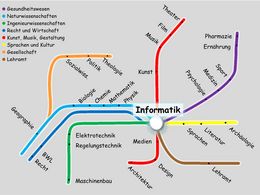Bachelor in Computing Science (single subject)
Bachelor in Computing Science (single subject)
General Information
Orientation and Goals
Without computing science and its products, modern life would be difficult to imagine. Computers have not only become indispensable organisers of information and work processes; they have also become a normal part of private life. Alongside these 'visible' computers, however, 'embedded systems' or processors play an important role, for example in cars, aeroplanes, or in every day household items such as washing machines.
All of these applications are underpinned by the systematic, automated processing of information, and ultimately the academic discipline 'computing science'.
In studying Computing Science, you will acquire not only the necessary basic knowledge, but also practical skills that can either set you on a career path or open the door to more in-depth studies at the master's level.
The bachelor's programme in Computing Science distinguishes itself especially through its perfect coordination of basic knowledge and practical skills; each lecture is expanded upon through exercises with small groups. Students gain knowledge and skills in software systems development through interrelated series of lectures including programming courses, software engineering, a one year software project, and a graduate thesis.
Learning is gradually and systematically planned, and supplemented by a class on 'soft skills' in conveying professionalising skills, such as presentation techniques and self and team organisation. Team work is a universal theme here, and it is practiced from the beginning on in solving minor tasks and working on projects. Numerous departmental research projects and cooperation with the affiliated institute OFFIS ensure that current research issues are quickly incorporated into teaching, especially in projects and theses.
The affiliated institute OFFIS and the alumni association OLDIES offer the opportunity for early contacts in the professional world.


